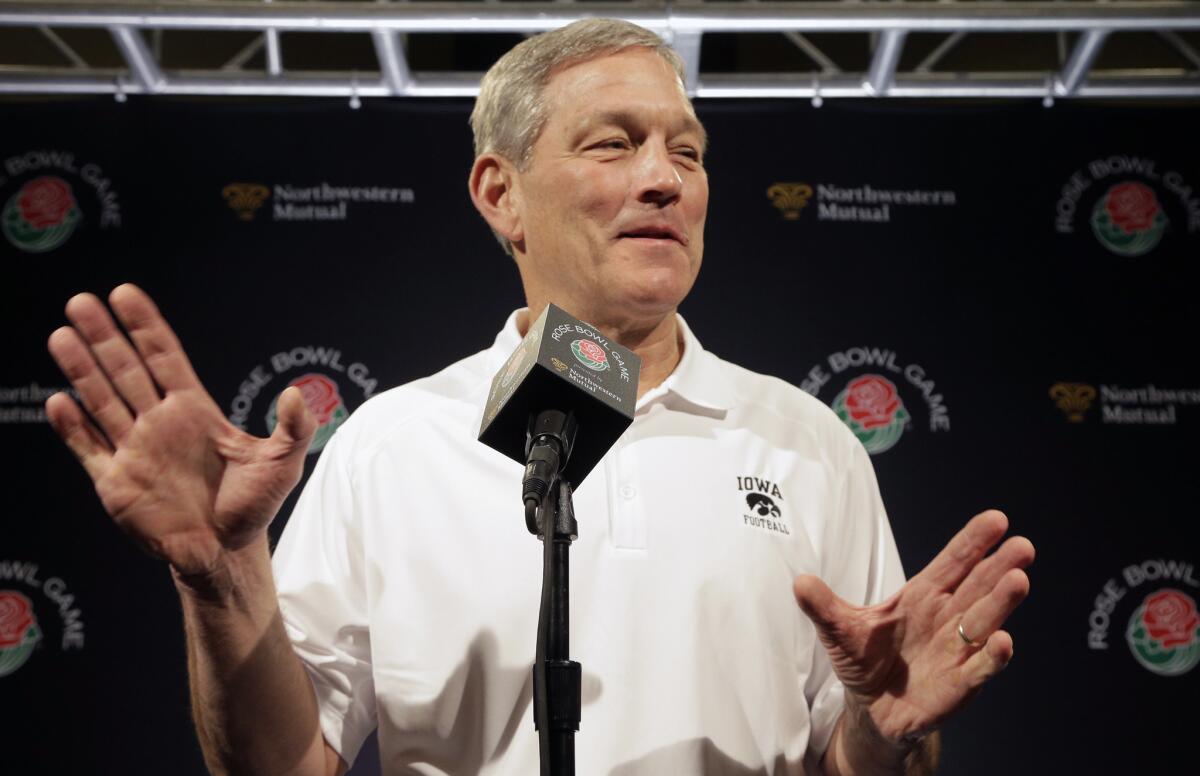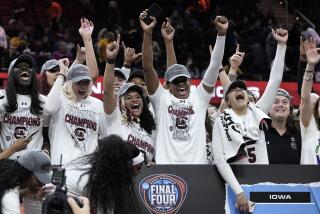Impressive turnaround season took the heat off formerly embattled Iowa Coach Kirk Ferentz

Iowa Coach Kirk Ferentz talks to reporters during the team’s Rose Bowl media day.
- Share via
There was trouble in Iowa City last January after the Iowa football team put the finishing smudges on a 7-6 season with an uninspiring 45-28 loss to Tennessee in the TaxSlayer Bowl.
Phone calls and emails from angry fans poured into the office of Hawkeyes Athletic Director Gary Barta, most with the same charge: the message and methods of long-time Coach Kirk Ferentz had grown stale.
It wasn’t only the four losses in five games to end 2014 that soured the Iowa faithful. It was the way the Hawkeyes, always known for physical play, were manhandled by Minnesota, Wisconsin, Nebraska and Tennessee, who racked up a combined 1,001 yards rushing.
“There was a lot of heat,” Barta said. “We lost 17% of our season-ticket base this year, and that translates into significant financial pressure on the program. We had a lot of people calling for a change in both football coach and athletic director.”
Firing Ferentz, 60, wasn’t really an option, not when it would have cost the school $13 million to buy out a 10-year contract that pays Ferentz between $3.5 million and $4 million a season through 2020.
Barta met with Ferentz, liked the changes the coach proposed for 2015 and retained him — a move Ferentz rewarded by guiding Iowa to a 12-1 record, a No. 5 national ranking and a berth in Friday’s Rose Bowl game against sixth-ranked Stanford.
“It wasn’t the Titanic sinking last November,” Ferentz said during Tuesday’s Rose Bowl media day. “Now, if you lived in Iowa, you might have felt that way, and I get that. I’m not tone-deaf.
“But a lot of times in life, when it seems like the sky might be falling, it usually isn’t. When you make some smart adjustments and listen to people that have good input, usually things are addressable.”
A complete overhaul of the program was not necessary, but a reboot was in order. Ferentz and his staff put renewed emphasis on strength and conditioning, toughness and resiliency.
Run offense, run defense, special-teams play and turnover ratio — trademarks of the four Ferentz teams that finished in the top 10 nationally — had to improve. So did team chemistry. Senior leadership needed to be stronger.
“As a staff, we all agreed at the end of last year that we were broken, because what we were doing was not working,” said Brian Ferentz, Kirk’s son and Iowa’s offensive line coach.
“We were 7-6. That’s not what we strive toward. Our goal is to be a championship football program, and we did not come close to that. When you look at the talent we had, we felt we did not maximize what we had on our roster.”
A major change came in January, when Kirk Ferentz announced that backup quarterback C.J. Beathard would replace two-year starter Jake Rudock, who subsequently transferred to Michigan.
Beathard, with a stronger arm, more mobility and a gunslinger’s mentality, completed 202 of 329 passes for 2,570 yards, with 15 touchdowns and four interceptions, and led Iowa to the brink of the College Football Playoff before a 16-13 loss to Michigan State in the Big Ten Conference championship game.
“C.J. had a live arm and good feet — my sister could have told you that, and she’s a lifetime elementary school teacher,” Ferentz said. “Really, the story with C.J. is his development, his maturity. He grew. We threw it open for both players to compete last December, and that was the decision we made.”
Players worked harder in the weight room last spring, sharpened their focus in practice during the summer and held each other more accountable through the fall. They played with more of an edge, and with each win confidence and camaraderie grew.
“It was people getting on people, teammates getting after each other and not letting them quit,” senior defensive end Drew Ott said. “We got a little relaxed last year, and we weren’t tough enough to finish games. We have a tougher mentality this year and are getting things done.”
The result was Iowa’s first undefeated regular season since 1922 and its first Rose Bowl appearance in 25 years, a bounce-back season that pushed Ferentz off the hot seat and back to his perch as an Iowa institution/legend.
With the retirement of Virginia Tech’s Frank Beamer, Ferentz, in his 17th season at Iowa, joins Oklahoma’s Bob Stoops as the longest-tenured coaches in the country, a remarkable run in times of constant turnover.
Since Ferentz replaced 20-year Iowa coach Hayden Fry in 1999, there have been 55 coaches at the other 13 Big Ten schools. Since the beginning of this season, there have been 26 coaching changes at Football Bowl Subdivision schools.
“I think it speaks to how good a coach he is,” Iowa receiver Matt VandeBerg said. “Most coaches, two or three years, they’re out and the school is looking for somebody else. So for him to stay here that long, it really speaks to his character and what he’s been able to build here.”
David Shaw, in his fifth season as Stanford’s coach, marvels at Ferentz’s longevity.
“That’s the hardest thing to achieve in major college sports,” said Shaw, whose father, Willie, coached for 33 years, mostly in the NFL. “To be at one place where your message never gets old, where your ideals and program goals don’t get diluted, where you can have a great season followed by an OK season and everyone says we love you and want you … It’s always been that way at Iowa.”
Shaw recalled being 7 and having to “pack boxes in my room because we had to move because everybody got fired because we had one bad year,” he said.
Seeing Ferentz, who spent nine seasons (1981-89) as Fry’s offensive line coach, gives Shaw hope.
“People look at it and say, ‘That’s the way to do it, the way Iowa does it,’” Shaw said. “That’s what you said about Bobby Bowden, Tom Osborne, Bo Schembechler, all those great coaches. Coach Ferentz is an icon, and that’s a tough thing to do.”
Twitter: @MikeDiGiovanna
More to Read
Go beyond the scoreboard
Get the latest on L.A.'s teams in the daily Sports Report newsletter.
You may occasionally receive promotional content from the Los Angeles Times.











